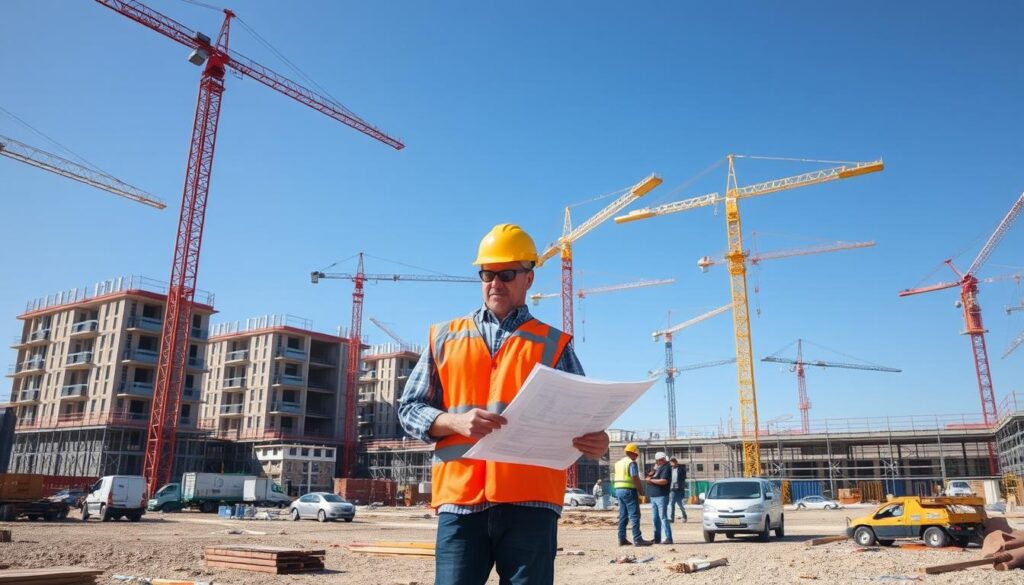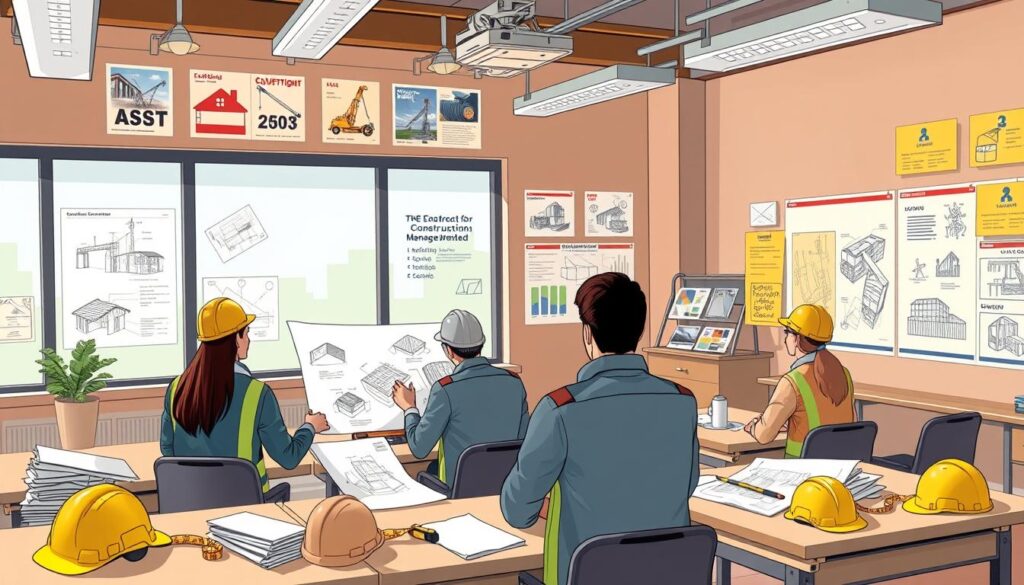Standing at the edge of a massive construction site, I saw blueprints turn into towering structures. It was amazing. If you dream of leading complex building projects and shaping skylines, becoming a construction manager might be your dream job.
Construction managers are key in making architectural dreams come true. They plan, coordinate, budget, and supervise projects from start to finish. Their job requires leadership, technical skills, and strategic planning.
The construction industry is exciting and offers great opportunities. With a growth rate of 8% from 2020 to 2030, becoming a construction manager is a rewarding career. Your path will need dedication, education, and a love for building amazing spaces.
If you’re a recent graduate or looking to change careers, knowing how to become a construction manager is key. This guide will help you understand the necessary steps, skills, and strategies for a successful career in construction management.
Understanding the Construction Manager Role and Responsibilities

A construction manager is key in making big building projects happen. They are the heart of successful construction, handling everything from start to finish. They make sure all parts of the project work together smoothly.
Construction managers focus on the small details that turn designs into real buildings. Their job is to make sure everything goes right, from start to finish.
Core Daily Tasks and Duties
Construction managers do many things every day. Here are some of their main tasks:
- Preparing detailed project budgets and timelines
- Coordinating with architects, engineers, and contractors
- Monitoring project progress and implementing quality control measures
- Ensuring compliance with building codes and safety regulations
- Managing resource allocation and equipment procurement
Project Oversight and Leadership Functions
Being a good construction manager means being a strong leader. You’ll make big decisions, solve problems, and keep the project moving. Being able to see problems coming and solve them is key to success in this field.
Interaction with Stakeholders
Construction managers are important for talking to different people involved in a project. They talk to:
- Clients and property owners
- Subcontractors and trade specialists
- Local government officials
- Regulatory compliance teams
The Bureau of Labor Statistics says construction manager jobs will grow by 9% from 2023 to 2033. This means over 520,000 jobs will be available in the U.S. This growth shows how much we need skilled people in construction.
Educational Requirements for Construction Management

Starting a career in construction management means knowing the educational steps to success. You need a solid education to handle the industry’s complex challenges.
Most employers want candidates with a bachelor’s degree in construction management or similar fields. You’ll need to finish a four-year degree program. This training covers essential skills for overseeing construction projects.
Degree Options and Curriculum
- Bachelor’s degree in Construction Management (120 credits)
- Degrees in related fields:
- Engineering
- Architecture
- Building Science
- Associate’s degree as an alternative entry point
To become a construction manager, you’ll learn about important skills. These include:
- Project planning and scheduling
- Cost estimation
- Building codes and regulations
- Construction technologies
- Safety management
While a bachelor’s degree is common, some go for more. About 6% of construction managers get a master’s degree. This can open up more career opportunities.
| Degree Level | Average Tuition | Career Impact |
|---|---|---|
| Associate’s Degree | $10,000-$15,000 | Entry-level positions |
| Bachelor’s Degree | $40,000-$60,000 | Standard management roles |
| Master’s Degree | $20,513 per year | Advanced leadership positions |
Education is key, but experience matters too. A mix of book smarts and real-world skills is best for a construction management career.
How to Become a Construction Manager: Essential Steps
Starting a career in construction management needs careful planning and hard work. Your journey to becoming a top construction manager includes key steps. These steps will guide your career path.
To turn your love for construction into a fulfilling job, you must navigate through education, experience, and professional growth. These milestones are crucial.
Earning the Right Degree
Your journey to becoming a construction manager begins with education. Most employers want candidates with a bachelor’s degree in construction management or a similar field. It usually takes four years to finish this degree.
- Choose an accredited construction management program
- Focus on courses in project management, building technologies, and business administration
- Maintain a strong academic record
Gaining Practical Experience
Getting hands-on experience is key in construction management careers. Most employers look for 2-5 years of industry experience before considering you for management roles.
- Seek internships during your academic years
- Start in entry-level construction positions
- Work across different construction roles to build comprehensive skills
Building Professional Networks
Networking is vital in construction management careers. It’s known that 70% of job placements occur through professional connections.
| Networking Strategy | Potential Impact |
|---|---|
| Industry conferences | Expand professional connections |
| Professional associations | Access job opportunities |
| Online professional platforms | Connect with industry professionals |
By following these essential steps, you’ll be well-positioned to build a successful career in construction management. You’ll use education, experience, and professional relationships to your advantage.
Required Skills and Competencies
To be a top construction manager, you need both technical skills and personal qualities. The construction world is complex. It needs leaders who can handle projects with precision and skill.
Your success depends on a wide range of skills. These include technical knowledge and the ability to work well with others. Let’s look at the key skills of the best construction managers:
Technical Skills
- Advanced knowledge of construction techniques
- Financial management and budgeting
- Project planning and scheduling
- Safety regulation understanding
- Technical software proficiency
Soft Skills
- Strong leadership capabilities
- Exceptional communication skills
- Problem-solving expertise
- Critical decision-making abilities
- Adaptability in dynamic environments
Employers want managers who are good at solving problems and working with people. Skills like accounting, estimating, and safety management are vital for success.
| Skill Category | Key Competencies | Importance Level |
|---|---|---|
| Technical Skills | Financial Analysis | High |
| Leadership Skills | Team Management | Critical |
| Communication | Stakeholder Interaction | Essential |
Staying up-to-date with new skills is crucial. With a 9% job growth expected from 2023 to 2033, improving your skills will help you stand out in the construction world.
Industry Certifications and Licensing
Getting into construction management needs smart choices in certifications. Knowing the right ones can boost your career and show you’re a pro in construction management.
Certifications are key steps to becoming a top construction manager. They prove your skills, knowledge, and dedication to top standards.
Certified Construction Manager (CCM)
The Construction Management Association of America (CMAA) has the Certified Construction Manager (CCM) badge. It shows you’re a pro and needs certain skills:
- At least eight years of construction or design work
- Four years of leading
- Bachelor’s degree holders need four years of construction work
- Renew every three years with training
State-Specific Requirements
Requirements for construction managers change by state. Some places need special licenses or certifications. Make sure you follow local rules.
| Certification Type | Experience Required | Renewal Period |
|---|---|---|
| Construction Manager in Training | Entry-level | Annual |
| Certified Construction Manager | 8+ years | 3 years |
| OSHA Safety Certification | 10-30 hour course | Periodic |
Additional Professional Certifications
Get more certifications to stand out in construction management:
- Project Management Professional (PMP)
- LEED Green Associate
- Safety Certifications from OSHA
- American Institute of Constructors Certifications
Getting these certifications shows you’re serious about growing in your career. Each one is a step up towards success and recognition in the field.
Career Advancement and Growth Opportunities
Your journey in construction management careers is full of exciting opportunities. As you grow in construction management, you’ll find many chances to move up in your career.
Getting better at your job and gaining experience leads to bigger roles. Starting out, you’ll have many chances to climb the career ladder.
- Entry-level positions start with salaries ranging from $40,000 to $50,000
- Senior roles can reach $200,000 in specialized sectors like energy and infrastructure
- Advanced certifications dramatically improve career prospects
There are several ways to move up in your career:
- Project Management Track: From project coordinator to senior project manager
- Specialization Path: Focus on specific construction domains like residential, commercial, or industrial projects
- Executive Leadership: Progress to director or executive-level positions
| Career Stage | Average Salary | Experience Required |
|---|---|---|
| Entry-Level Project Manager | $90,144 | 0-3 years |
| Senior Project Manager | $126,297 | 7-11 years |
| Director of Project Management | $154,674 | 12+ years |
Networking is key to moving up in construction management careers. Making professional connections can open doors to new opportunities and keep you updated on industry trends.
Keep learning, get advanced certifications, and show leadership skills. These will help you grow in construction management construction.
Salary Expectations and Job Outlook
Construction management careers are both financially rewarding and full of growth chances. The field is popular for its good pay and strong job outlook.
Thinking about a construction manager job? Knowing the salary range is key. Recent data shows the financial benefits of this career are quite appealing.
Regional Salary Variations
Construction manager salaries differ by region. The average salary is $97,768 a year. The highest earners can make up to $156,000.
| State | Average Salary | Top Earning Potential |
|---|---|---|
| Hawaii | $124,000 | $177,000 |
| California | $101,000 | $160,000 |
| Washington | $92,000 | $140,000 |
| New Jersey | $92,000 | $140,000 |
Future Industry Projections
The construction management job market is growing fast. Here are some key points:
- Jobs are expected to increase by 4.5% by 2032.
- About 23,000 new positions will be added.
- The industry will grow by 10%, faster than most jobs.
Top-Paying States
Your salary can vary a lot based on where you work. Cities like San Francisco, Los Angeles, and Boston pay construction managers well.
With new tech and more demand for skilled workers, construction management is a great career choice.
Construction Management Technology and Tools
The world of construction management has changed a lot with new digital technologies. Today, construction managers use advanced tools to make projects run smoother, improve communication, and work more efficiently.
Digital technologies are changing how we manage construction projects. Some key innovations include:
- Project Management Software
- Building Information Modeling (BIM)
- Cloud-based Collaboration Platforms
- Drone Surveillance Systems
- Augmented Reality (AR) Technologies
Now, construction projects rely a lot on digital tools. About 40% of construction companies use digital project management tools. This is a 15% increase in the last few years.
Construction managers need to know how to use software like Procore and Autodesk BIM 360. These tools help teams work together in real time. They also help track projects better and cut down on mistakes.
| Technology | Efficiency Improvement | Key Benefits |
|---|---|---|
| BIM Technology | Up to 20% | 3D Visualization, Error Reduction |
| Drone Inspections | 15% | Site Monitoring, Safety Enhancement |
| IoT Sensors | 25% | Equipment Performance Tracking |
New technologies like augmented reality and robotics are changing construction management. They offer new ways to see and work on projects. Keeping up with these new tools is important for growing professionally and staying ahead in the field.
Building a Professional Portfolio
Creating a compelling professional portfolio is key when learning to become a construction manager. Your portfolio is a powerful tool to show your skills, achievements, and journey in construction management careers.
A well-planned portfolio can greatly boost your job chances. Studies show that 68% of hiring managers see a strong portfolio as a big factor in their hiring decisions. To stand out, focus on building a detailed and engaging collection of your professional work.
- Highlight successful project completions
- Include quantifiable achievements
- Demonstrate technical and leadership skills
- Showcase project diversity
What makes a portfolio stand out includes:
| Portfolio Component | Impact Percentage |
|---|---|
| Quantifiable Achievements | 30% Higher Impression Rate |
| High-Quality Visuals | 50% More Employer Engagement |
| Regular Updates | 40% Increased Callback Rate |
| Multi-Device Accessibility | 60% Higher Interaction Rate |
When making your portfolio for construction management careers, keep it short and impactful. Aim for a review time of about 10 minutes. This lets potential employers quickly see your skills.
Digital presentation is important. Create a portfolio that works on many platforms and shows your tech skills. Include photos, architectural renderings, and clear summaries that show your strengths in construction management.
Conclusion
Starting a career as a construction manager is exciting and full of opportunities. The field is growing fast, with jobs expected to increase by 8% from 2022 to 2032. Success comes from being well-prepared and always learning new skills.
To become a great construction manager, focus on education, hands-on experience, and networking. Most jobs require a bachelor’s degree in construction management and lots of experience. It’s a challenging path, but about 75% of people start at the bottom to learn and grow.
Your career in construction management can be very rewarding. Salaries range from $70,000 to $120,000 a year. With certifications like the Certified Construction Manager (CCM), you can move up. Good communication skills, knowledge of project management, and keeping up with new technologies are key.
The construction industry values those who are ready to learn, adapt, and grow. Your career begins with education, expands with experience, and flourishes with ongoing learning. Start your journey today and turn your passion for building into a fulfilling career in construction management.
